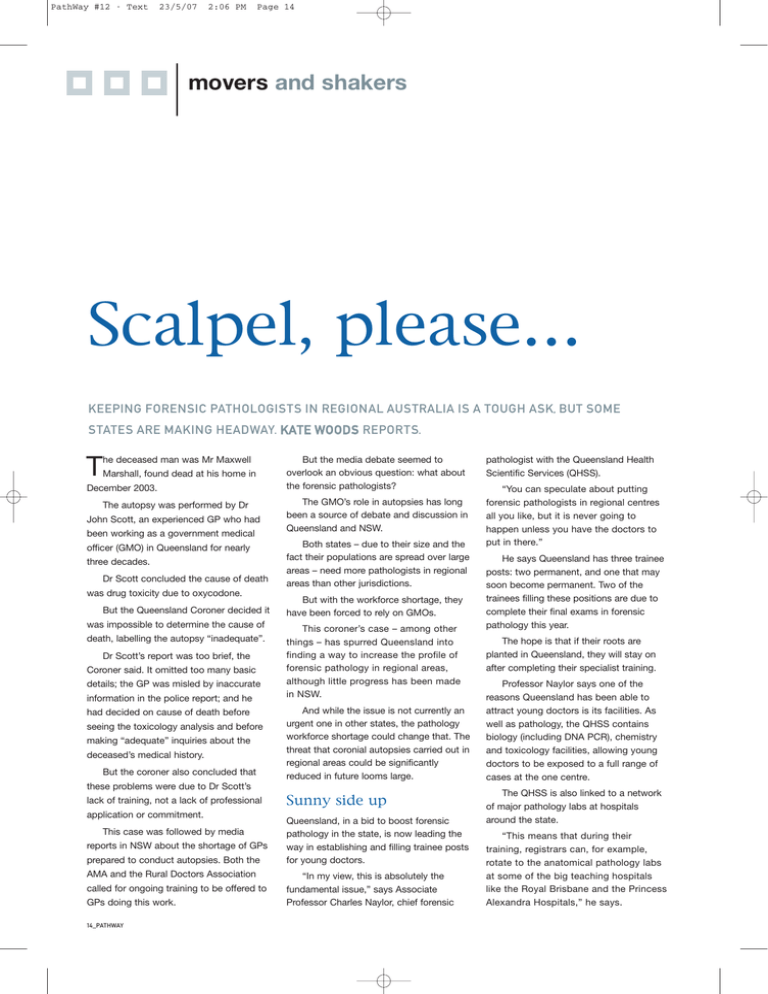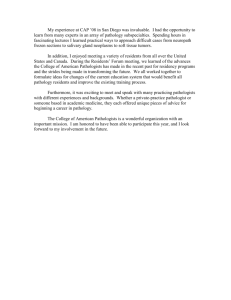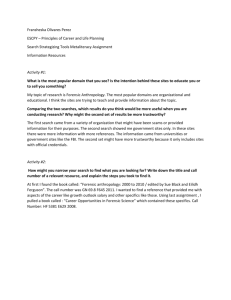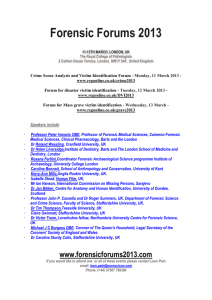T
advertisement

PathWay #12 - Text 23/5/07 2:06 PM Page 14 movers and shakers Scalpel, please… KEEPING FORENSIC PATHOLOGISTS IN REGIONAL AUSTRALIA IS A TOUGH ASK, BUT SOME STATES ARE MAKING HEADWAY. KATE WOODS REPORTS. he deceased man was Mr Maxwell T Marshall, found dead at his home in December 2003. The autopsy was performed by Dr John Scott, an experienced GP who had been working as a government medical officer (GMO) in Queensland for nearly three decades. Dr Scott concluded the cause of death was drug toxicity due to oxycodone. But the Queensland Coroner decided it was impossible to determine the cause of death, labelling the autopsy “inadequate”. Dr Scott’s report was too brief, the Coroner said. It omitted too many basic details; the GP was misled by inaccurate information in the police report; and he had decided on cause of death before seeing the toxicology analysis and before making “adequate” inquiries about the deceased’s medical history. But the coroner also concluded that these problems were due to Dr Scott’s lack of training, not a lack of professional application or commitment. This case was followed by media reports in NSW about the shortage of GPs prepared to conduct autopsies. Both the AMA and the Rural Doctors Association called for ongoing training to be offered to GPs doing this work. 14_PATHWAY But the media debate seemed to overlook an obvious question: what about the forensic pathologists? The GMO’s role in autopsies has long been a source of debate and discussion in Queensland and NSW. Both states – due to their size and the fact their populations are spread over large areas – need more pathologists in regional areas than other jurisdictions. But with the workforce shortage, they have been forced to rely on GMOs. This coroner’s case – among other things – has spurred Queensland into finding a way to increase the profile of forensic pathology in regional areas, although little progress has been made in NSW. And while the issue is not currently an urgent one in other states, the pathology workforce shortage could change that. The threat that coronial autopsies carried out in regional areas could be significantly reduced in future looms large. Sunny side up Queensland, in a bid to boost forensic pathology in the state, is now leading the way in establishing and filling trainee posts for young doctors. “In my view, this is absolutely the fundamental issue,” says Associate Professor Charles Naylor, chief forensic pathologist with the Queensland Health Scientific Services (QHSS). “You can speculate about putting forensic pathologists in regional centres all you like, but it is never going to happen unless you have the doctors to put in there.” He says Queensland has three trainee posts: two permanent, and one that may soon become permanent. Two of the trainees filling these positions are due to complete their final exams in forensic pathology this year. The hope is that if their roots are planted in Queensland, they will stay on after completing their specialist training. Professor Naylor says one of the reasons Queensland has been able to attract young doctors is its facilities. As well as pathology, the QHSS contains biology (including DNA PCR), chemistry and toxicology facilities, allowing young doctors to be exposed to a full range of cases at the one centre. The QHSS is also linked to a network of major pathology labs at hospitals around the state. “This means that during their training, registrars can, for example, rotate to the anatomical pathology labs at some of the big teaching hospitals like the Royal Brisbane and the Princess Alexandra Hospitals,” he says. PathWay #12 - Text 23/5/07 2:06 PM Page 15 “You can speculate about putting forensic pathologists in regional centres all you like, but it is never going to happen unless you have the doctors to put in there.” PHOTO CREDIT: ROBERT SHAKESPEARE – Associate Professor Charles Naylor “And while we might not be unique in this, we are probably better placed than most to offer this kind of well-rounded training to young doctors, and that is probably why we have had success in attracting and recruiting trainee forensic pathologists in Brisbane.” In Queensland, forensic trainees are attached to forensic laboratories from their first year of training and any time spent on rotation to other laboratories is paid for by the forensic lab. Keeping connected In other states, trainees are attached to an anatomical pathology laboratory for the first three years of training to obtain the basic surgical pathology they requre to be a forensic pathologist. As a result, they often get disconnected from forensics and lose interest. The Queensland model overcomes this problem and the RCPA is trying to encourage other states to adopt a similar model. With the ability to train and maintain forensic pathologists, the state is now working on an innovative way to promote the service in regional and remote areas. The initiative came about after a ministerial taskforce was established in 2005 to look at forensic services and the challenges it was facing, Professor Naylor explains. Of the 70 recommendations made by the taskforce, more than 90% were endorsed by Cabinet, including one that outlined the need to develop standard procedures for autopsies and running mortuaries across the state. As part of this drive, Queensland Health decided to establish facilities at seven regional centres, with enough trained mortuary staff and pathologists to service the local area. Dr Peter Ellis is the first forensic pathologist to be placed in a regional area under this scheme. Although he has only been in the job for four months or so, he says he is “delighted” with the situation. He says there are many benefits to working in a regional area over a big capital city like Sydney, where he worked for 19 years before taking up this post. “I have a reasonable workload, interesting case material and have been able to develop good, close relationships with the police, Coroner and other professional colleagues, which makes for better and more efficient working conditions.” Dr Ellis says while the downside to working in a regional area can be professional isolation, countering this was at the “top of the list” when he and Queensland Health were designing his post. The solution? He travels back to the QHSS one day a fortnight. “Maintaining professional contact with your peers is important in maintaining your standards. You need to be able to exchange ideas, bounce ideas off them, and if you are 500 km away from the nearest significant centre this becomes difficult. “If you can counter that or make provisions, then you are more likely to attract people to rural areas, including places as distant as Cairns or Rockhampton.” Dr Ellis adds there are also limitations with the type of cases that can be performed at his mortuary, because the facilities are not as large or as well equipped as they are at the larger centres. “It’s a bit of an experiment, but very exciting to be part of,” he says. “There are also a number of specialist trainees in the pipeline, which bodes quite well for the future. The hope is we will be able to spread this kind of regional service elsewhere in the state very soon.” PATHWAY_15 > PathWay #12 - Text 23/5/07 2:06 PM Page 16 In the shadows In NSW however, things aren’t looking up, though it’s not for want of trying on the part of forensic pathologists. Associate Professor Johan Duflou says there are a number of reasons for the shortage, including the low profile pathology has in the medical curriculum, and the low profile forensic pathology has among other medical practitioners – despite the popularity of crime television programs such as CSI. Very few medical schools have a formal series of lectures in forensic pathology, so students are not exposed to the topic and therefore don’t consider it when deciding their future, explains the chief forensic pathologist at the Department of Forensic Medicine, Glebe. And then there is the job itself. The work is “smelly”, night call-outs are not uncommon, and court appearances frequent. “On top of that, there is an income differential between forensic and anatomical pathology in NSW which is not insignificant; about $1000 a week,” Professor Duflou says. “Frankly, if you are starting out and get offered two jobs, one gets paid 50 grand more than the other, what would you do?” of Forensic Medicine, this system actually The institute – responsible for forensic pathology and clinical forensic medicine services throughout the state – has five or have been able to develop good, close relationships with undertake coronial autopsies on its behalf. the police, Coroner and other There are no GMOs because under Victorian law, autopsies must be carried professional colleagues” out by a pathologist or a medical – Dr Peter Ellis practitioner under the direct supervision of a pathologist. “Certain cases do automatically come to Melbourne – for example sudden infant death syndrome cases, all homicides, multiple fatalities and any other deaths the pathologists in regional areas are not happy to do,” Professor Cordner says. Shrinking numbers But he predicts this may not last long, with the continuous decline in pathologists expected to make it increasingly difficult to maintain the service in the future. “In the middle 1990s, about 800 or 900 deaths were autopsied in country Victoria every year; now the number is more like 400.” Professor Cordner says the main reason for this decrease is because some country centres now have their pathology “Over the decades, there have been multiple working parties and committees looking at the structure of forensic pathology services in NSW, and not surprisingly, they consistently come up with the same ideas – it’s just that these ideas keep being rejected.” inclination to engage with this work, and services provided remotely, and therefore autopsies have had to be transferred to Melbourne. It is also because some pathologists, for a range of reasons, don’t have a strong historically the pay has not been commensurate with the responsibility. While this second issue is being addressed with assistance from the state government, Professor Cordner says Victoria may have to consider other options, such as the feasibility of having forensic pathologists travel from the city to regional centres for certain cases. “The numbers do show an absolutely continuous downward trend in autopsies carried out in country areas due to the “It was a government policy decision, I suspect because they didn’t see the value in committing extra resources and funding in it.” unavailability of pathologists. But according to Professor Stephen Cordner, director of the Victorian Institute ones whisked hundreds of miles away to 16_PATHWAY interesting case material and six regional centres with pathologists who Professor Duflou is a member of the NSW Department of Health’s Forensic Pathology Services Committee, which is looking at service delivery throughout the state, but he says the solutions they are coming up with aren’t new. He says there was a plan to develop a NSW Forensic Medicine and Pathology Authority, which would operate in a similar way to the Victorian Institute of Forensic Medicine – “a statutory body with an independent board” – but this too was scrapped. “I have a reasonable workload, works “very well” in his state. “We are trying to maintain country services for as long as possible because we know families don’t want their loved the capital cities.”





